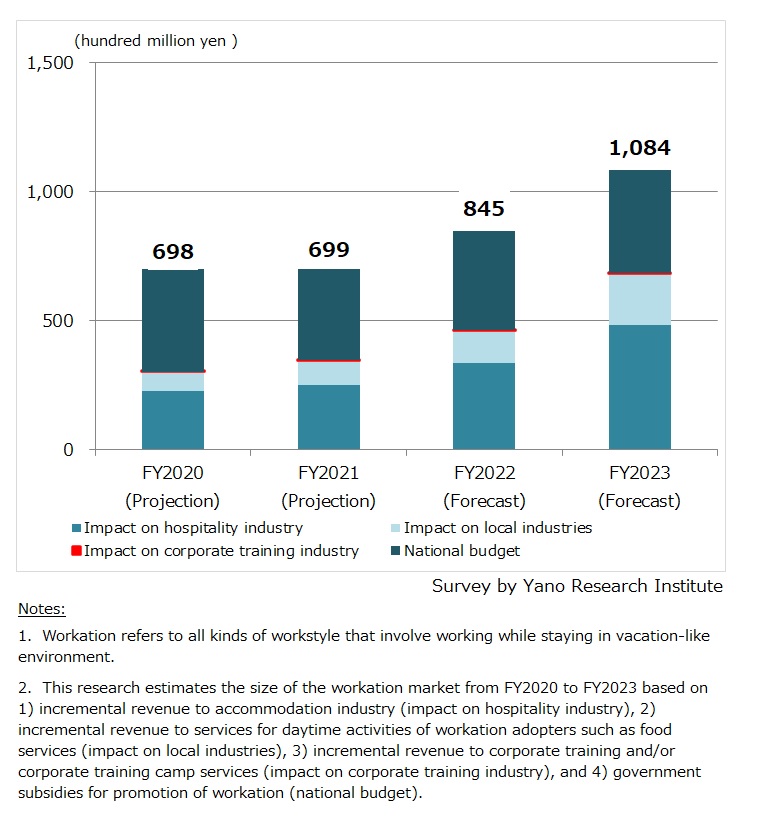No.3056
Workation Market in Japan: Key Research Findings 2022
Workation Market in Japan Reaches Approximately 70,000 Million Yen for FY2021
Yano Research Institute (the President, Takashi Mizukoshi) has conducted a survey on the workation market in Japan and found out the attempts and plans for the future among market stakeholders (local governments, various associations, service providers, etc.). This press release announces the estimate on the size of workation market from FY2020 to FY2023.

Market Overview
Workation is a term coined to describe a combination of “work” and “vacation”. The workation market had been a very limited market, which is formed of businesspersons that have latitude to decide on location of telework and so-called digital nomads (who do not work from office, but from places such as coffee shops and co-working spaces).
Nonetheless, the spread of COVID-19 in 2020 presented an opportunity for the domestic workation market to grow to 70,000 million yen for FY2021, as a number of companies jumped to telework and the number of individuals accepting to pay for workation out of one’s own pocket (just like the workation adopters in the US-European countries do) increased. In FY2022, many companies place importance on in-person communication and thus promote hybrid workstyle, which is a combination of telework and in-office work. In a meantime, companies are also terminating restrictions on employees' area of residence and means of transportation for the sake of improving employee recruitment and/or reducing commuting allowance and office rent. In addition, supported by the government subsidies, more and more municipalities are adopting workation as a strategy to revitalize local economies. For these reasons, the number of workation adopters are rising gradually, and the market size is forecasted to exceed 100,000 million yen by FY2023.
Future Outlook
In accordance with the increase in the number of local governments and associations promoting workation, and the rapid expansion of businesses providing workation-related services, various attempts are seen in the market. However, it is undeniable that overall drive to grow the workation market is still weak because domestic companies are slow in making progress in adopting workation.
Currently, the market driver is the individuals, the workation adopters who pay for workation out of one’s own pocket (US-European-style workation adopters). It is assumed that many of them take it for granted that they pay for their workation. For the workation market in Japan to expand beyond the scale of the forecast, it is necessary for the companies that implement workation to determine how they manage workation, i.e., to develop the Japanese-style workation management where companies bear the costs of accommodations, training and training camp services for workation.
To expand the workation market further, new demand must be created, a demand that is not based on an idea that workation is just another opportunity in tourism industry. It is important that companies make investments to the workation market.
Research Outline
2.Research Object: Local governments promoting workation, industries providing workation services (real estate, tourism, human resource development services), and companies adopting workation
3.Research Methogology: Face-to-face interviews by our specialized researchers (including online interviews), corporate questionnaire, and literature research
Workation Market
“Workation” is a term coined to describe a combination of “work” and “vacation”. In this research, workation refers to all kinds of workstyle that involve working while staying in vacation-like environment.
Size of the workation market for FY2020 and up to FY2023 is estimated based on 1) incremental revenue to accommodation industry (impact on hospitality industry), 2) incremental revenue to services for daytime activities of workation adopters such as food services (impact on local industries), 3) incremental revenue to corporate training and/or corporate training camp services (impact on corporate training industry), and 4) government subsidies for promotion of workation (national budget).
<Products and Services in the Market>
(1) Incremental revenue to accommodation industry (impact on hospitality industry), (2) incremental revenue to services for daytime activities of workation adopters such as food services (impact on local industries), (3) incremental revenue to corporate training and/or corporate training camp services (impact on corporate training industry), (4) government subsidies for promotion of workation (national budget)
Published Report
Contact Us
The copyright and all other rights pertaining to this report belong to Yano Research Institute.
Please contact our PR team when quoting the report contents for the purpose other than media coverage.
Depending on the purpose of using our report, we may ask you to present your sentences for confirmation beforehand.